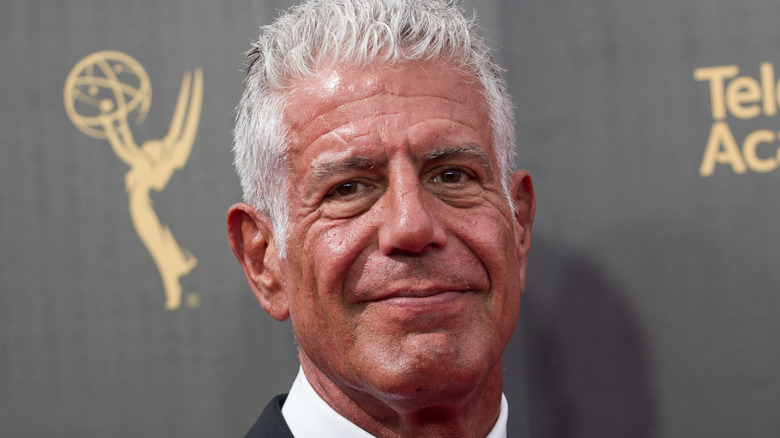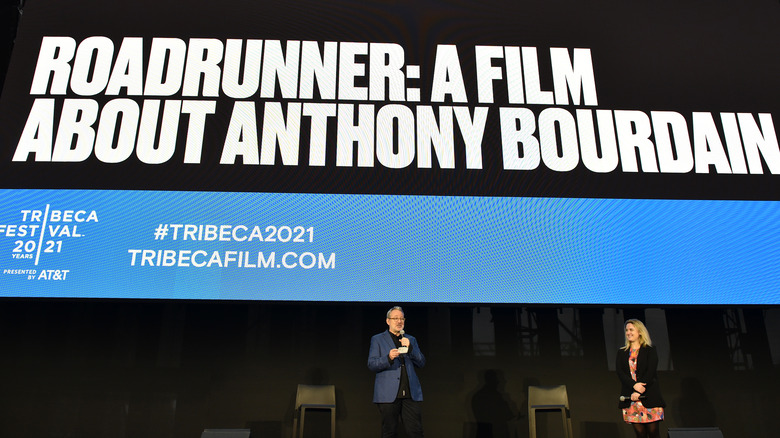The Roadrunner Moment That Has Anthony Bourdain Fans Furious
Anyone who's seen an episode of "Parts Unknown" or has read a page from one of Anthony Bourdain's bestselling books knows that the late star did more than just comment about food and travel. He sought to understand food as an extension of the human experience, and introduced audiences around the world to cultures and cuisines through his unparalleled insight, honesty, and respect.
According to the New Yorker, the documentary about Bourdain's life called "Roadrunner," directed by Oscar award-winning filmmaker Morgan Neville, attempts to explore how and why someone who dedicated so much of his life to telling the stories of others, would place such little value on his own.
From the New Yorker essay that jumpstarted his career, to his travels across the globe, leading up to his final days and tragic passing, "Roadrunner" highlights the major and minor moments of Bourdain's life. Through interviews with those closest to him, the documentary attempts to piece together what Bourdain was like when he wasn't in front of the camera. And what the interviews revealed, as Neville recounted to the magazine, was that "The TV Tony and the real Tony were not exactly the same person. They never could be. He played himself on television."
Considering he chose to keep so much of his private life to himself, fans are therefore all the more enraged that the film not only shared his personal final notes and letters, but also deep-faked Bourdain's voice to have them read them out loud on screen.
A.I. was used to recreate Anthony Bourdain's voice in 'Roadrunner'
Possibly the most heartbreaking scene in the film, at least the one most widely scrutinized on Twitter, depicts Anthony Bourdain's close friend David Choe discussing the e-mail Bourdain sent him before ending his life. In the scene, Choe begins reading from the e-mail, then Bourdain's voice takes over.
When the New Yorker asked director Morgan Neville how he managed to find a recording of Bourdain reading his own e-mail, the filmmaker explained it wasn't actually Bourdain speaking, but rather an A.I. model of Bourdain's voice based on pre-existing recordings. "If you watch the film, other than that line you mentioned, you probably don't know what the other lines are that were spoken by the A.I., and you're not going to know," Neville claims.
It's a revelation that stunned viewers of the film, who seem to agree all across the board that they find it disturbing and disrespectful to Bourdain's memory. "It is so wild to do a documentary on someone like Bourdain, a subject with 10,000+ hours of recorded audio of his voice and writing to mine from for your film, and then decide to make a deep-fake recreation of the few quotes you don't have clips of," @JoshhhTerry wrote.
Ironically, as @HannahSulwen pointed out, not only do ethics come into question, but it's also the kind of thing Bourdain would've hated. "This makes me so sad," said another Twitter user — which is clearly a feeling felt by many. As another person Tweeted, "I dunno if I can watch the Bourdain doc now."
If you or anyone you know is having suicidal thoughts, please call the National Suicide Prevention Lifeline at 1-800-273-TALK (8255).
If you or someone you know is struggling with mental health, please contact the Crisis Text Line by texting HOME to 741741, call the National Alliance on Mental Illness helpline at 1-800-950-NAMI (6264), or visit the National Institute of Mental Health website.

